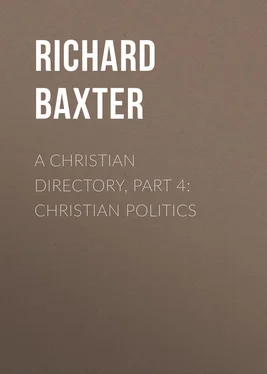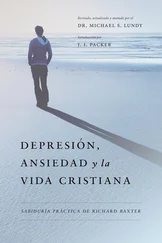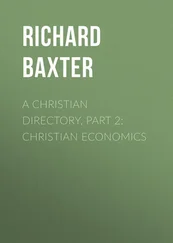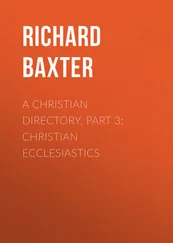Richard Baxter - A Christian Directory, Part 4 - Christian Politics
Здесь есть возможность читать онлайн «Richard Baxter - A Christian Directory, Part 4 - Christian Politics» — ознакомительный отрывок электронной книги совершенно бесплатно, а после прочтения отрывка купить полную версию. В некоторых случаях можно слушать аудио, скачать через торрент в формате fb2 и присутствует краткое содержание. Жанр: foreign_antique, foreign_prose, на английском языке. Описание произведения, (предисловие) а так же отзывы посетителей доступны на портале библиотеки ЛибКат.
- Название:A Christian Directory, Part 4: Christian Politics
- Автор:
- Жанр:
- Год:неизвестен
- ISBN:нет данных
- Рейтинг книги:3 / 5. Голосов: 1
-
Избранное:Добавить в избранное
- Отзывы:
-
Ваша оценка:
- 60
- 1
- 2
- 3
- 4
- 5
A Christian Directory, Part 4: Christian Politics: краткое содержание, описание и аннотация
Предлагаем к чтению аннотацию, описание, краткое содержание или предисловие (зависит от того, что написал сам автор книги «A Christian Directory, Part 4: Christian Politics»). Если вы не нашли необходимую информацию о книге — напишите в комментариях, мы постараемся отыскать её.
A Christian Directory, Part 4: Christian Politics — читать онлайн ознакомительный отрывок
Ниже представлен текст книги, разбитый по страницам. Система сохранения места последней прочитанной страницы, позволяет с удобством читать онлайн бесплатно книгу «A Christian Directory, Part 4: Christian Politics», без необходимости каждый раз заново искать на чём Вы остановились. Поставьте закладку, и сможете в любой момент перейти на страницу, на которой закончили чтение.
Интервал:
Закладка:
I have purposely been the larger on this subject, because the times in which we live require it, both for the settling of some, and for the confuting the false accusations of others, who would persuade the world that our doctrine is not what it is; when through the sinful practices of some, the way of truth is evil spoken of, 2 Pet. ii. 2.
The word conscience signifieth either, 1. In general according to the notation of the word, The knowledge of our own matters; conscire ; the knowledge of ourselves, our duties, our faults, our fears, our hopes, our diseases, &c. 2. Or more limitedly and narrowly, The knowledge of ourselves and our own matters in relation to God's law and judgment; Judicium hominis de seipso prout subjicitur judicio Dei , as Amesius defineth it.
2. Conscience is taken, 1. Sometimes for the act of self-knowing. 2. Sometimes for the habit. 3. Sometimes for the faculty, that is, for the intellect itself, as it is a faculty of self-knowing. In all these senses it is taken properly. 4. And sometimes it is used (by custom) improperly, for the person himself, that doth conscire ; or for his will (another faculty).
3. The conscience may be said to be bound, 1. Subjectively, as the subjectum quod , or the faculty obliged. 2. Or objectively, as conscire , the act of conscience, is the thing ad quod , to which we are obliged.
And upon those necessary distinctions I thus answer to the first question.
Prop. 1. The act or the habit of conscience is not capable of being the subject obliged; no more than any other act or duty: the act or duty is not bound, but the man to the act or duty.
2. The faculty or judgment is not capable of being the object, or materia ad quam , the thing to which we are bound. A man is not bound to be a man, or to have an intellect, but is made such.
3. The faculty of conscience (that is, the intellect) is not capable of being the immediate or nearest subjectum quod , or subject obliged. The reason is, Because the intellect of itself is not a free-working faculty, but acteth necessarily per modum naturæ further than it is under the empire of the will; and therefore intellectual and moral habits are by all men distinguished.
4. All legal or moral obligation falleth directly upon the will only: and so upon the person as a voluntary agent; so that it is proper to say, The will is bound, and The person is bound.
5. Improperly and remotely it may be said, The intellect (or faculty of conscience) is bound, or the tongue, or hand, or foot is bound; as the man is bound to use them.
6. Though it be not proper to say, That the conscience is bound, it is proper to say, That the man is bound to the act and habit of conscience, or to the exercise of the faculty.
7. The common meaning of the phrase, that we are bound in conscience, or that conscience is bound, is that we are bound to a thing by God, or by a divine obligation, and that it is a sin against God to violate it; so that divines use here to take the word conscience in the narrower theological sense, as respect to God's law and judgment doth enter the definition of it.
8. Taking conscience in this narrower sense, to ask, Whether man's law as man's do bind us in conscience, is all one as to ask, Whether man be God. 112
9. And taking conscience in the large or general sense, to ask, Whether man's laws bind us in conscience subjectively, is to ask, Whether they bind the understanding to know our duty to man? And the tenor of them will show that, while they bind us to an outward act, or from an outward act, it is the man that they bind to or from that act, and that is, as he is a rational, voluntary agent; so that a human obligation is laid upon the man, on the will, and on the intellect, by human laws.
10. And human laws, while they bind us to or from an outward act, do thereby bind us as rational free agents, knowingly to choose or refuse those acts; nor can a law which is a moral instrument any otherwise bind the hand, foot, or tongue, but by first binding us to choose or refuse it knowingly, that is, conscientiously, so that a human bond is certainly laid on the mind, soul, or conscience, taken in the larger sense.
11. Taking conscience in the stricter sense, as including essentially a relation to God's obligation, the full sense of the question plainly is but this, Whether it be a sin against God to break the laws of man? And thus plain men might easily understand it. And to this it must be answered, That it is in two respects a sin against God to break such laws or commands as rulers are authorized by God to make; 1. Because God commandeth us to obey our rulers: therefore he that (so) obeyeth them not, sinneth against a law of God. God obligeth us in general to obey them in all things which they are authorized by him to command; but their law determineth of the particular matter; therefore God obligeth us (in conscience of his law) to obey them in that particular. 2. Because by making them his officers, by his commission he hath given them a certain beam of authority, which is divine as derived from God; therefore they can command us by a power derived from God: therefore to disobey is to sin against a power derived from God. And thus the general case is very plain and easy, How man sinneth against God in disobeying the laws of man, and consequently how (in a tolerable sense of that phrase) it may be said, that man's laws do or do not bind the conscience, (or rather, bind us in point of conscience,) or by a divine obligation. Man is not God; and therefore, as man, of himself can lay no divine obligation on us. But man being God's officer, 1. His own law layeth on us an obligation derivatively divine (for it is no law which hath no obligation, and it is no authoritative obligation which is not derived from God). 2. And God's own law bindeth us to obey man's laws.
Quest. II. But is it a sin to break every penal law of man?
Answ. 1. You must remember that man's law is essentially the signification of man's will; and therefore obligeth no further than it truly signifieth the ruler's will.
2. That it is the act of a power derived from God; and therefore no further bindeth, than it is the exercise of such a power.
3. That it is given, 1. Finally for God's glory and pleasure, and for the common good (comprehending the honour of the ruler and the welfare of the society ruled). And therefore obligeth not when it is, (1.) Against God. (2.) Or against the common good. 2. And it is subordinate to God's own laws, (in nature and Scripture,) and therefore obligeth not to sin, or to the violation of God's law. 113
4. You must note that laws are made for the government of societies as such universally; and so are fitted to the common case, for the common good. And it is not possible but that a law which prescribeth a duty which by accident is so to the most, should meet with some particular subject to whom the case is so circumstantiated as that the same act would be to him a sin: and to the same man it may be ordinarily a duty, and in an extraordinary case a sin. Thence it is that in some cases (as Lent fasts, marriages, &c.) rulers oft authorize some persons to grant dispensations in some certain cases: and hence it is said, that necessity hath no law.
Hereupon I conclude as followeth:
1. It is no sin to break a law which is no law, as being against God, or not authorized by him, (as of a usurper, &c.) See R. Hooker, Conclus. lib. viii.
2. It is no law so far as it is no signification of the true will of the ruler, whatever the words be: therefore so far it is no sin to break it.
3. The will of the ruler is to be judged of, not only by the words, but by the ends of government, and by the rules of humanity.
Читать дальшеИнтервал:
Закладка:
Похожие книги на «A Christian Directory, Part 4: Christian Politics»
Представляем Вашему вниманию похожие книги на «A Christian Directory, Part 4: Christian Politics» списком для выбора. Мы отобрали схожую по названию и смыслу литературу в надежде предоставить читателям больше вариантов отыскать новые, интересные, ещё непрочитанные произведения.
Обсуждение, отзывы о книге «A Christian Directory, Part 4: Christian Politics» и просто собственные мнения читателей. Оставьте ваши комментарии, напишите, что Вы думаете о произведении, его смысле или главных героях. Укажите что конкретно понравилось, а что нет, и почему Вы так считаете.












